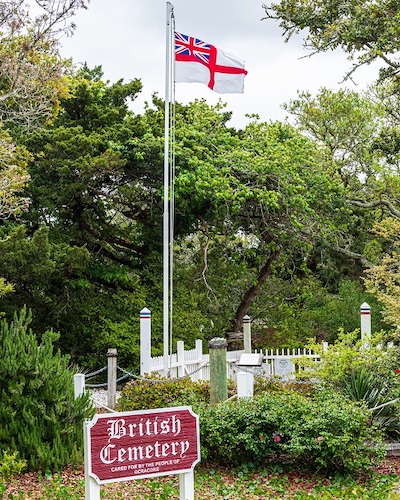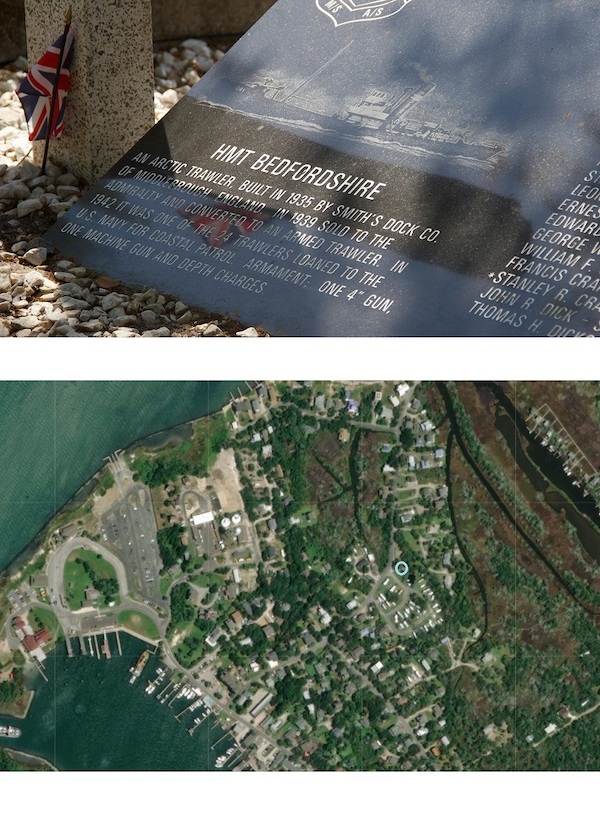Peirspictiochtai Ar An Saol
Options To Update Immigration Policies Into The United States Of America
Part One
 The White Ensign of the United Kingdom flies over the land that is the site of the Ocracoke Island British Cemetery in North Carolina. (This photograph was provided courtesy of Paul Diming, April 25, 2021.)
The White Ensign of the United Kingdom flies over the land that is the site of the Ocracoke Island British Cemetery in North Carolina. (This photograph was provided courtesy of Paul Diming, April 25, 2021.)
The United States of America has had a variety of official and unofficial policies towards immigration into the country since its founding as an independent nation.
Official policies have focused on who is allowed to immigrate legally into the country. These policies sometimes included quotas for specific nationalities. In some years, people from Country "X" would be welcomed, while people from Country "Y" would be excluded from legal immigration options.
Exceptions to welcome those facing danger were provided on occasion through asylum procedures, while exceptions to welcome individuals in unusual circumstances were provided sometimes through parole processes.
Unofficial policies have been taken when those in positions of power chose to look the other way as people entered the country without proper documentation or people allowed to enter the nation for certain time periods and/or for specific situations who stayed after those official permissions had expired. Sometimes, this has been when the country needed people to do specific types of work or when policies desired by those in power could not be implemented through official channels.
In other words, there have been times when people have immigrated to this country illegally.
We have been – and are – living through such times.
During the next few weeks, a series of news columns through Peirspictiochtai Ar An Saol will be presented detailing how existing systems could be adapted to encourage legal immigration and discourage illegal immigration while at the same time providing humane and respectful treatment for people who may or may not be aware that their efforts to enter the country are being done in violation of official immigration policies of the United States of America.
The existing systems referenced through Peirspictiochtai Ar An Saol generally have nothing to do with immigration – done legally or illegally. What they do, though, is provide options to consider for a new framework on unofficial immigration into the country.
The first aspect for a new framework would include land within the United States of America potentially being provided to another independent nation to house people who have entered this country unofficially.
It may sound impossible to provide land within this country to another independent nation, but there is precedent for such actions.
In 1976, the State of North Carolina leased a small plot of land to the United Kingdom in perpetuity.
The land is the site of the Ocracoke Island British Cemetery.
"While out patrolling for German submarines off the North Carolina coast during World War II, the British ship HMT Bedfordshire was torpedoed on May 11, 1942," according to a statement from the National Park Service. "German U-boat 558 fired a torpedo that struck HMT Bedfordshire in a manner that caused the vessel to sink almost immediately. All 37 British Royal Navy sailors were killed. In the following days, the bodies of four sailors washed ashore on Ocracoke Island and were buried in local cemetery plots by residents."
Those four sailors were buried by local folks on private land on Ocracoke Island.
Two of the men buried here were identified by name: Sub-Lieutenant Thomas Cunningham and Ordinary Telegraphist Stanley Craig. The other two men were never identified by name.
Please note that members of the Canadian Royal Navy were also aboard the HMT Bedfordshire and were among the 37 people who died in the military attack by Germany.
As of part of the United States Bicentennial, the State of North Carolina acquired the privately-owned land where the four men were buried and then leased the small cemetery permanently to the United Kingdom.
According to several news reports, on August 20, 1976, a representative of the Commonwealth War Graves Commission was presented with the documentation from the State of North Carolina confirming a permanent lease on American territory.
The Commonwealth War Graves Commission describes itself as "…a global leader in commemoration. Founded by Royal Charter in 1917, we work on behalf of the Governments of Australia, Canada, India, New Zealand, South Africa, and the United Kingdom to commemorate the 1.7 million men and women from the Commonwealth who lost their lives in the two World Wars."
The cost for the permanent lease was $1.
Headlines in newspapers throughout America detailed the lease. The Miami Herald in its edition dated June 17, 1976, reported that "Cemetery In Carolina To Become British Soil." On June 16, 1976, The Bonham Daily Favorite of Texas included a headline of "Site To Become Part Of England."
According to the Commonwealth War Graves Commission, the cemetery is maintained on its behalf by the United States Coast Guard.
The permanent lease of a small plot of land is important in highlighting that land in the United States of America could potentially be leased on a permanent basis to another nation.
 The Ocracoke Island British Cemetery is the final resting place for four men who died while protecting the United States of America during World War II. (The top photograph was provided courtesy of the National Park Service.) The blue circle is the approximate location of the Ocracoke Island British Cemetery in North Carolina. (The map was provided courtesy of the United States Geological Survey, 2024.)
The Ocracoke Island British Cemetery is the final resting place for four men who died while protecting the United States of America during World War II. (The top photograph was provided courtesy of the National Park Service.) The blue circle is the approximate location of the Ocracoke Island British Cemetery in North Carolina. (The map was provided courtesy of the United States Geological Survey, 2024.)
The next news column will focus on the diplomatic protections provided to select people traveling in specific vehicles.
Peirspictiochtai Ar An Saol – Gaelic – Irish – for "Perspectives On Life" is a column focused on aspects of accountability and responsibility as well as ways people look at life.
Contact Richard McDonough at
© 2024 Richard McDonough










